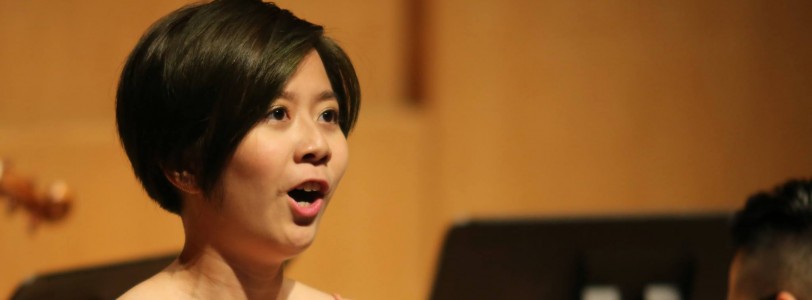I have trained as a classical/opera singer for 10 years and singing has become an inseparable part of my life. I have learnt to listen to my inner self and my physical body. I’ve learnt to be expressive using my voice, movement and facial expression. I’ve learnt to channel my imagination through music-making.
Breath
Opera singing is not always as difficult as it sounds. The key to opera singing is also what we human beings do every day – breathing. Breathing is one of the keys to producing a good sound/voice. In his book ‘When in doubt, breathe out!’ Ron Morris - who is an advocate of accented breathing method and also one of my teachers - keeps reminding us how breathing out is so important, and yet is easily forgotten and neglected. We tend to overthink when we sing. Many of us try to make a pre-imagined sound and are unnecessarily critical to ourselves on techniques. This causes out body to tense, especially the throat, and hinder our breath flow. Let it go! As Ron always says, singing should be “comfortable, effortless and efficient”!
Hydration
Our body is our instrument. Hydration is the first point on our list to taking care of our instrument and making sure it works to the best of its ability. Always drink plenty of water, not just before you sing but throughout the day. Try to carry a water bottle with you wherever you go. It’s important to keep our mouth and throat well lubricated, as not only does it make singing and articulation easier, it also prevents injuries to the vocal cords. Our vocal cords vibrate a lot when we sing (and speak!), and it’s important that mucus is there to protect them.
Fitness
Singers are just like athletes. We need to practise on a regular basis so that little and big muscles in our body are always awake and ready for singing. However, exercise does not only happen in the practice room. I try to exercise several times a week. There are various types of exercises you can do to suit yourself, such as aerobic, strength and flexibility. Aerobic exercises help increase your endurance, which is especially important for singing as it requires a lot of breath control. Martial arts and yoga can also help with focus and tackling stage anxiety. By having a good level of fitness your posture, body alignment, confidence and energy will all be improved.
Non-judgemental awareness
We all have a tendency to criticise ourselves on the tiniest details. On the bright side, it’s good to be able to acknowledge what we can do better. However, these monstrous thoughts can easily distract us from focusing on the performance while we’re on stage. These thoughts can make us anxious and will create tension in the body as well as complicate the mind. It’s a vicious cycle. Therefore, try to simply acknowledge the faults in ourselves – they are probably only noticeable by ourselves a lot of the time, and then let the thoughts go. Focus on the future, not the past.
Communicator
As a performer, our main goal is to be a communicator. In order to communicate well, we must be sincere. The audience wants to listen to you, the real you. We must learn to accept who we are and who we are not. We must be brave and embrace our imperfections as no one is perfect. Audiences will understand and connect with you when you put down your façade, and they will in return, without noticing. When we don’t have the burden of the need to be a perfect performer, we are able to be free and adventurous with our musical expression. Try to channel a rise of adrenaline of nervousness into excitement. Most of my best singing has happened on stage rather than at home, when I’ve had the excitement of performing to a live audience.
Don’t act, be
We are often given a character to play with when singing, either in opera or concert pieces. Sometimes, we have to make a character up after reading the text for a performance. The character we choose to play could be in line with our own personality or completely opposite. We spend a lot of time in the preparation process asking: Who am I? Who am I talking to? I find it the fun part of character building! Whoever we are trying to perform as on stage, we must try our best to internalise the character as well. Don’t just act, be. Take the opportunity to live as another person within those few minutes or hours on stage, be transported to a different universe!
Remember why you started singing in the first place
We all have a reason to sing. It could be as simple as you love singing. Never forget the first reason that embarked you on your singing journey. The sheer joy of it that made you go so far. Before you go on stage, open your arms, take a confident stance, take a deep breath, and ask yourself why you started singing in the first place? This is your performance, believe in yourself, own it and ENJOY!







This is fascinating, Chloe! Would love to hear more of your insights into opera on Voice. It's an art form that many people are a bit nervous about!